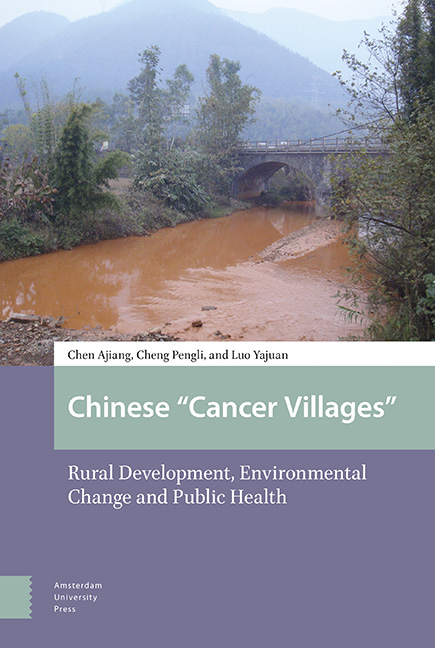Book contents
- Frontmatter
- Contents
- List of Figures, Graphs and Tables
- Acknowledgements
- Preface to the English Language Edition
- 1 Retrospective Thoughts on the ‘Cancer Village’ Phenomenon
- 2 The Ins and Outs of a ‘Cancer Village’
- 3 A Subei ‘Cancer Village’
- 4 Environmental Change and Health Risks
- 5 A Prosperous ‘Cancer Village’
- 6 Coexistence of Poverty and Cancer
- 7 Problematization and De-stigmatization
- 8 Behind the ‘High Incidence of Lung Cancer’
- 9 Villagers’ Perceptions of and Responses to the Relationship between Cancer and Pollution
- 10 Villagers Strategies for Mitigating Environmental Health Risks
- Index
- Index (Chinese) 中文索引
1 - Retrospective Thoughts on the ‘Cancer Village’ Phenomenon
Published online by Cambridge University Press: 20 November 2020
- Frontmatter
- Contents
- List of Figures, Graphs and Tables
- Acknowledgements
- Preface to the English Language Edition
- 1 Retrospective Thoughts on the ‘Cancer Village’ Phenomenon
- 2 The Ins and Outs of a ‘Cancer Village’
- 3 A Subei ‘Cancer Village’
- 4 Environmental Change and Health Risks
- 5 A Prosperous ‘Cancer Village’
- 6 Coexistence of Poverty and Cancer
- 7 Problematization and De-stigmatization
- 8 Behind the ‘High Incidence of Lung Cancer’
- 9 Villagers’ Perceptions of and Responses to the Relationship between Cancer and Pollution
- 10 Villagers Strategies for Mitigating Environmental Health Risks
- Index
- Index (Chinese) 中文索引
Summary
From a long-term perspective, the phenomenon of ‘cancer villages’ may perhaps turn out to be a fleeting one in the history of environment and health in China. The 2004 CCTV (China Central Television) programme ‘Rivers and Villages’ made the issue a hot topic and drew public attention to other mentions of ‘cancer villages’ that had been circulating over the previous few years. Five years later, in 2009, the National Key Laboratory for Environmental Chemistry and Ecological Toxicology of the Chinese Academy of Sciences organized the 29th International Symposium on Halogenated Persistent Organic Pollutants – Dioxin in Beijing. After the Symposium, CCTV broadcast a programme titled ‘International Symposium on Dioxin Finds Waste Disposal Encountering Problems, and Dioxin is Troubling China’. Waste incinerators became a focus of contention and ‘cancer villages’ became a hot topic again. In 2013, the Ministry of Environmental Protection's ‘12th Five Year Plan for the Prevention and Control of Chemical Environmental Risks’ formally acknowledged the problem of ‘cancer villages’, bringing the question of whether they existed, which had persisted for about ten years, to a sort of conclusion.
If we take a ten-year time frame, we can more or less distill the social logic behind the emergence of the topic of ‘cancer villages’. After reform and opening up began in 1978, China's economy developed rapidly and with this came progressive worsening of environmental pollution. This had serious negative impacts on the ecological environment, which in turn affected the economy and society. China is a huge country, with great regional diversity, so it is not surprising that some places would have a higher incidence of cancer than others. At the same time, there was an imbalance of power in the ability of different social actors to deal with pollution. Local governments, under pressure to increase GDP (Gross Domestic Product), and driven by their own interests, allied themselves with enterprises, making it hard for ordinary people affected by pollution to fight back.
- Type
- Chapter
- Information
- 'Chinese Cancer Villages'Rural Development, Environmental Change and Public Health, pp. 29 - 52Publisher: Amsterdam University PressPrint publication year: 2020



